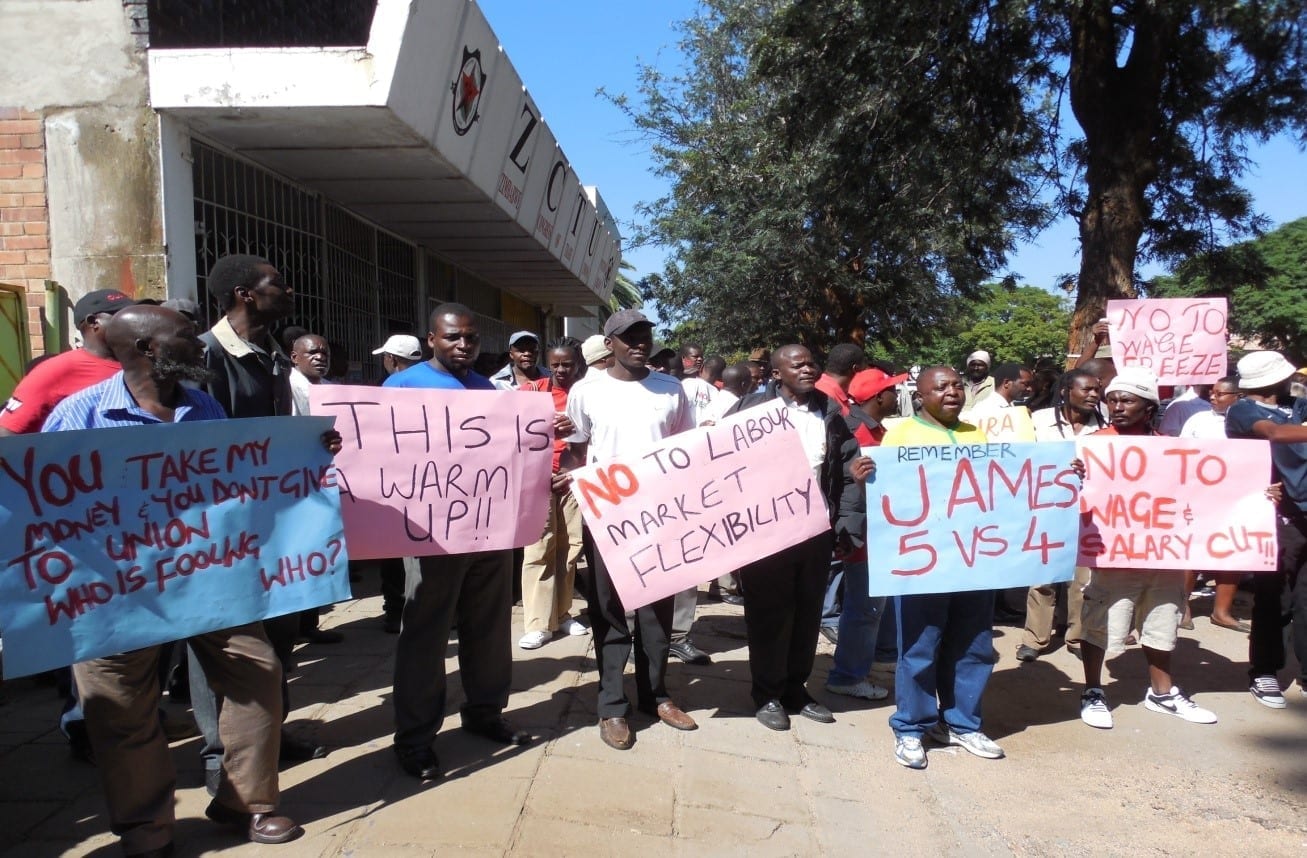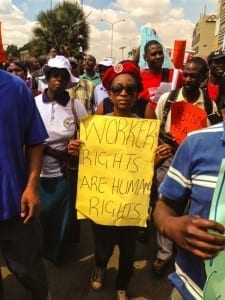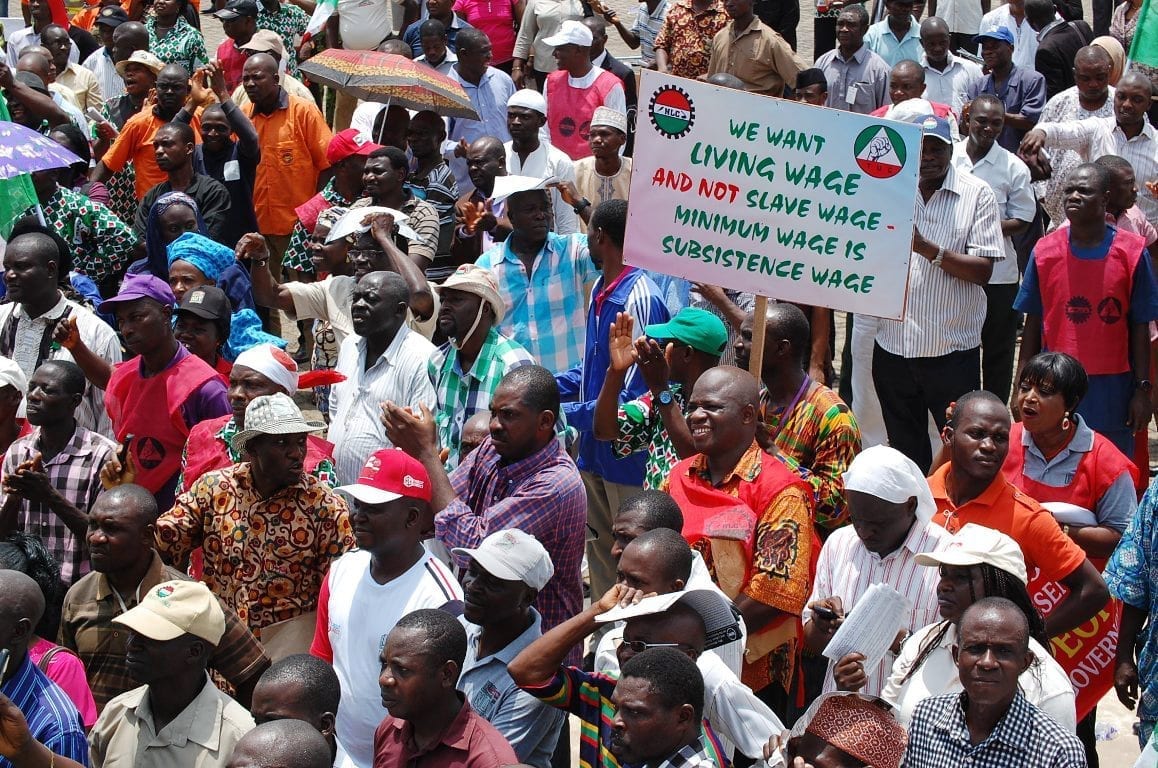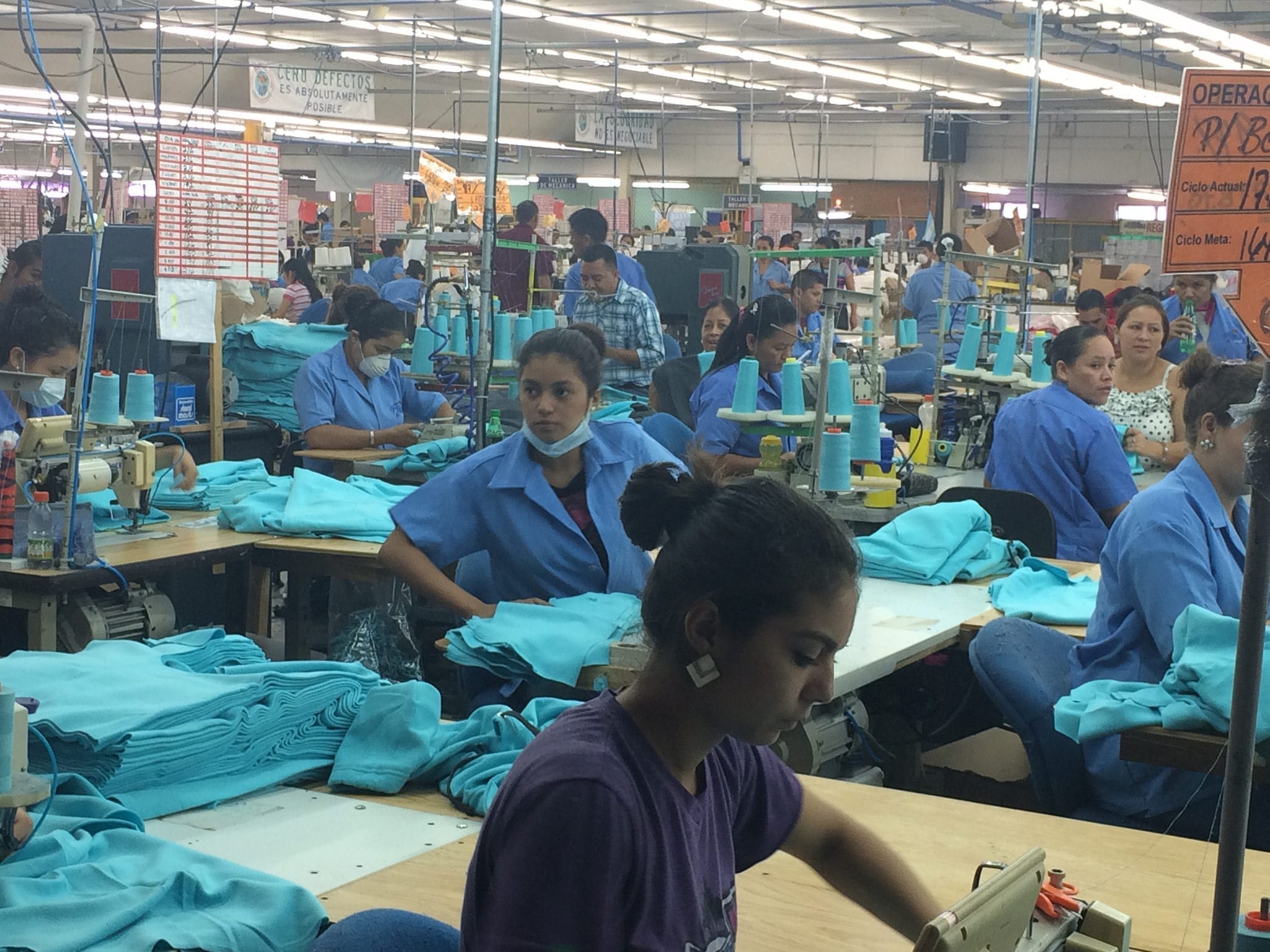
Apr 13, 2015
Fed up with unpaid wages, salaries that are below the poverty line, few jobs available in the formal sector and a proposed wage freeze, Zimbabwe workers took to the streets in six cities Saturday to demand workers be paid and to petition the government to not arbitrarily change the labor law to empower employers to fire workers.

Workers rallied in cities across Zimbabwe Saturday. Credit: Thando Khoza
Carrying signs reading “Worker rights are human rights,” and “This year, we are not backing down,” workers presented government officials with a petition demanding officials honor their pledge to create 2 million jobs and rethink the introduction of so-called labor market flexibility, in which the brunt of economic reform falls on workers. (Read the full petition.)
“Senior government officials, including the minister of finance, want to turn the worker into a form of cheap labor,” Zimbabwe Congress of Trade Unions (ZCTU) President George Nkiwane said at the rally. “While it is the ordinary worker that is being made to suffer, the government is not taking any meaningful action on chief executives who are bleeding the economy by paying themselves huge salaries and perks.”
Wages average less than $250 a month—for the 30 percent of the population working in the formal economy—while the cost of living is as high as in New York City. Some 72 percent of the population lived below the poverty line in 2013. Increasing numbers of Zimbabweans are forced to seek a living in informal economy jobs like street vending, in which they have no income security and few, if any, social benefits like health care.
“We used to have over 1.5 million workers in the formal sector 10 years ago, but we would be lucky if we have 700,000 in the formal sector (today),” Nkiwane said.
Women are disproportionately represented in poor-paying informal economy jobs, and young workers in urban areas also lack jobs that pay a living wage, the ZCTU petition noted. Employers also increasingly subcontract dangerous jobs, and so avoid paying compensation to workers injured or made ill while on the job, the petition stated.

Fake press releases and pamphlets were distributed in advance of the rally, falsely stating the rallies had been cancelled. Credit: ZCTU
Protestors turned out in Bulawayo, Chinhoyi, Gweru, Harare, Masvingo and Mutare despite a campaign to fool workers into thinking the rally had been cancelled. Fake press releases and pamphlets, purportedly from ZCTU, were distributed in several cities in advance of the rally, telling workers it had been canceled.
The march took place in an increasingly threatening environment for activists. Last month, Itai Dzamara, a leading pro-democracy advocate, was abducted. He remains missing, and leading civil society organizations—including the ZCTU—are calling on the government to ascertain his whereabouts and prosecute his abductors.
Police in the cities of Bulawayo, Mutare and Masvingo initially refused to grant permission for the demonstrations, but reversed their decisions after the Harare police agreed to allow the demonstration there, according to the International Trade Union Confederation (ITUC).

Dec 5, 2014
Inequality around the world has its roots in the labor market, according to this year’s International Labor Organization’s (ILO) “Global Wage Report.” ILO research shows that increased worker productivity–particularly in developed economies, where inequality saw its widest increase—has had little effect on boosting wages. However, some emerging and developing economies, especially those focused on poverty reduction, did see inequality decline through a greater focus on more equitable wage distribution and increased paid (as opposed to self-) employment.
The ILO found that minimum wages contribute effectively to reducing wage inequality—and collective bargaining is “a key instrument for addressing inequality in general and wage inequality in particular.”
Some of the blame for flat wage growth can be laid on the 2008 financial crash, which pushed workers out of jobs and lowered growth rates in many economies. The long-term forces of globalization, technology and the decline of unions also have contributed to the problem.
“Average monthly real wages grew globally by 2 percent in 2013, down from 2.2 percent in 2012,” according to the report. Developing and emerging economies drove this growth: Asia saw a 6 percent increase, Eastern Europe and Central Asia nearly 6 percent and the Middle East saw real wages rise by almost 4 percent. Wages in Latin America and the Caribbean rose by less than 1 percent. Average wages in developed countries grew just 0.4 percent since 2009, despite a 5.3 percent increase in worker productivity.
Inequality fell most in Argentina and Brazil. Workers’ real wages in industrialized countries like Japan, Spain and the United Kingdom are less than they were in 2007.
In almost all countries surveyed, wage gaps remain between women and men, between national and migrant workers and between workers in the formal and informal economy.
According to the ILO, the gender “wage penalty” occurs despite education, experience and productivity, and often as a result of discrimination. Indeed, women’s average wages are between 4 percent and 36 percent less than men’s, and the gap widens for higher-earning women. Closing that gap will require policies to combat discrimination and gender-based stereotypes, and improve maternal, paternal and parental leave, says the report.
The ILO was created in 1919, as part of the Treaty of Versailles that ended World War I, to reflect the belief that universal and lasting peace can be accomplished only if it is based on social justice.
Read a summary of the full Global Wage Report.
Check out the Global Wage Report in Short (video).
Nov 27, 2014
In Haiti, the minimum wage has been, until this year, 200 gourdes a day (or $4.92), and 300 gourdes for piecework ($7.48). (The basic rate rose to 225 gourdes, or $5.61, this year.) In contrast, the Solidarity Center estimates a living wage in Port-au-Prince is about $28 a day.

Nov 7, 2014
Some 2,000 workers recently took part in a rally in Basra organized by the Southern Oil Workers Committee, after the government refused to negotiate over issues such as jobs for unemployed workers, skills training and higher pay for hazardous work.
In August 2013, the government excluded workers in the state-run oil sector from receiving wage and benefit increases granted to other public employees. Public-sector wage increases ranged from 5 percent to 114 percent.
Workers delayed the action because of the country’s ongoing instability. Meanwhile, the committee’s negotiation team traveled to Baghdad to meet with government officials at the Ministry of Oil. After negotiations stalled, workers waged a mass rally.
“We are determined to achieve our rights and find no other way to be heard than peaceful demonstrations and sit-in actions,” the Southern Oil Committee said in a statement.
Read the full list of oil workers’ demands in English and Arabic.

Oct 17, 2014
In a recent Solidarity Center delegation to Honduras, Metropolitan Washington, D.C., Labor Council President Josyln Williams, a Solidarity Center Executive Board member, and Rep. George Miller (D-Calif.), the leading Democratic member of the House Education and the Workforce Committee, examined firsthand how union and human rights activists are struggling to defend the rights of working Hondurans and ensure the basic livelihoods and survival of Honduran families.
The Solidarity Center delegation intersected with a parallel delegation of AFL-CIO leaders, including AFL-CIO Executive Vice President Tefere Gebre, a Solidarity Center board member, and Larry Cohen, Communications Workers of America president. Both groups met with Solidarity Center partner unions and numerous worker and human rights activists.
“Amazingly, all confirm a unified story—an economy in collapse, widespread violations of minimum wage and all social protection laws, small farmers forced from their land, subsistence farming replaced by African palm and the jobs created in maquila zones dwarfed by the numbers forced to leave ancestral lands and travel to cities already jammed,” said Cohen.
After meeting with more than 60 union activists from garment and auto parts factories, and with those from sectors in agriculture, ports, education and public service, delegates said the level of rights violations and repression of activists was overwhelming. The groups also met with human rights leaders focused on Garifuna (Afro-Honduran) rights and women’s rights.
Union leaders from the agricultural union, FESTAGRO (Federación de Sindicatos de Trabajadores de la Agroindustria), expressed concern over the likelihood of violent attacks for union activities as they organize among sugar cane workers—subcontractors who are not paid the minimum wage. FESTAGRO leaders pointed to one of their union’s leaders, Jésus Maria Martinez, who recently was forced to flee the country after receiving threats against his life, as a prelude to the kinds of attacks activists will face when organizing among sugar cane workers.
FESTAGRO General Secretary German Zepeda told Miller and Williams that despite the danger and the unresponsiveness of the state, FESTRAGRO sees organizing workers as the only way forward. FESTAGRO, a Solidarity Center ally, also is organizing in the melon sector, where the majority of seasonal workers are women, many of whom migrate to the city to seek work as domestic workers or in other informal economy jobs during the off-season.
Garifuna activists, too, said that despite the threats on their lives and communities, they would continue the fight to “live as they’ve always lived, on their own land,” and pleaded with the delegates to urge their country to “pay attention.” Garifuna activists are struggling to defend their economically rich land from powerful interests, including narco-traffickers and multinational companies. They have taken their cases to Inter-American Commission on Human Rights (IACHR) but have little hope that state will comply with any IACHR decision.
Delegation participants say they were “overwhelmed” with the information they received from union activists about widespread noncompliance with laws, including attacks against labor leaders, a lack of compliance with minimum wage laws and an unresponsive government, and assured union and community allies they would work to bring more attention to the work and struggle of Honduran activists.






